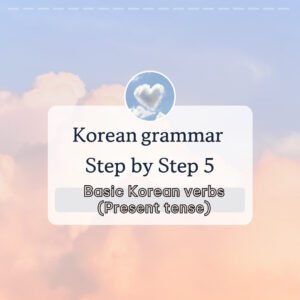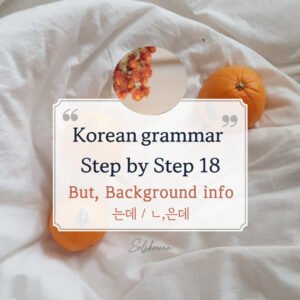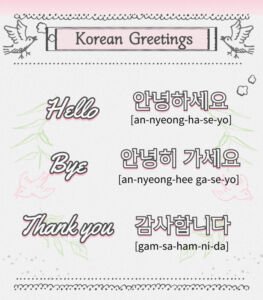Top 100 Common Korean Words with Quizlet : A Beginner’s Guide
Welcome back to our Korean learning blog.
In this beginner’s guide,
I’ve compiled a list of the top 100 common Korean nouns that you need to know.
These words are frequently used in everyday conversations and will help you understand and communicate more effectively. Let’s dive in and start expanding your Korean vocabulary! I’ve also added them on Quizlet, so after going through the vocab, you can use flashcards, which are one of the best ways to memorize.
If you don’t know how to read the Korean alphabet yet and would like to learn (you can master it in just 30 minutes!), please check out this post: Click here!
Let’s get started😸🐾

<The most common 100 Korean words>
- 안녕하세요 (annyeonghaseyo) – Hello
- 감사합니다 (gamsahamnida) – Thank you
- 네 (ne) – Yes
- 아니요 (aniyo) – No
- 죄송합니다 (joesonghamnida) – I’m sorry
- 이름 (ireum) – Name
- 엄마/어머니 (eomma/eomeoni) – Mom/Mother
- 아빠/아버지 (appa/abeoji) – Dad/Father
- 할머니(Halmoney) – Grandmother
- 할아버지(Halabeoji) – Grandfather
- 가족 (gajok) – Family
- 형(hyeong) – Older brother (For guys)
- 오빠(Oppa) – Older brother (For girls)
- 언니(unni) – Older sister (For girls)
- 누나(Nuna) – Older sister (For guys)
- 동생(dongsaeng) – Younger sibling
- 여자(yeoja) – Girl
- 남자(namja) – Guy
- 여동생(yeo dongsaeng) – Younger sister
- 남동생(Nam dongsaeng) – Younger brother
- 친척(cheen choek) – Relatives
- 삼촌(Sam chon) – Uncle
- 이모(eemo) – Aunt
- 사촌(sachon) – Cousin
- 조카(Joka) – Nephew, niece
- 사랑 (sarang) – Love
- 친구 (chingu) – Friend
- 학교 (hakgyo) – School
- 학생 (haksaeng) – Student
- 선생님 (seonsaengnim) – Teacher
- 일 (il) – Work
- 회사 (hoesa) – Company
- 회사원 (hoesawon) – Office worker
- 직업(jikup) – Job
- 음식 (eumsik) – Food
- 물 (mul) – Water
- 밥 (bap) – Rice/Meal
- 고기 (gogi) – Meat
- 생선 (saengseon) – Fish
- 야채 (yachae) – Vegetable
- 과일 (gwail) – Fruit
- 빵 (ppang) – Bread
- 커피 (keopi) – Coffee
- 차 (cha) – Tea
- 음료수 (eumlyosu) – Beverage
- 탄산음료 (tansan-eumlyo) – soda
- 집 (jip) – House
- 방 (bang) – Room
- 화장실 (hwajangsil) – Bathroom
- 침대 (chimdae) – Bed
- 의자 (uija) – Chair
- 책상 (chaeksang) – Desk
- 창문 (changmun) – Window
- 문 (mun) – Door
- 티비 (teevee) – TV
- 부엌 (booeok) – Kitchen
- 냉장고 (Naengjanggo) – Fridge
- 열쇠 (yeolsoe) – Key
- 자동차 / 차 (jadongcha) – Car
- 버스 (beoseu) – Bus
- 기차 (gicha) – Train
- 지하철 (jihacheol) – Subway
- 비행기 (bihaenggi) – Airplane
- 자전거 (jajeongeo) – Bicycle
- 길 (gil) – Road
- 거리 (geori) – Street
- 가게 (gage) – Store
- 시장 (sijang) – Market
- 백화점 (baekhwajeom) – Department store
- 마트(mart) – Supermarket
- 돈 (don) – Money
- 은행 (eunhaeng) – Bank
- 병원 (byeongwon) – Hospital
- 카드 (kadeu) – Card
- 시간 (sigan) – Time
- 오늘 (oneul) – Today
- 내일 (naeil) – Tomorrow
- 어제 (eoje) – Yesterday
- 지금 (jigeum) – Now
- 나중에 (najunge) – Later
- 아침 (achim) – Morning
- 점심 (jeomsim) – Afternoon
- 저녁 (jeonyeok) – Evening
- 밤 (bam) – Night
- 일요일 (iryoil) – Sunday
- 월요일 (woryoil) – Monday
- 화요일 (hwayoil) – Tuesday
- 수요일 (suyoil) – Wednesday
- 목요일 (mogyoil) – Thursday
- 금요일 (geumyoil) – Friday
- 토요일 (toyoil) – Saturday
- 주말(Jumal) – Weekend
- 이번주(eebeongju) – This week
- 다음주(daumju) – Next week
- 날씨 (nalssi) – Weather
- 비 (bi) – Rain
- 눈 (nun) – Snow
- 해 (hae) – Sun
- 구름 (gureum) – Cloud
- 바람 (baram) – Wind
You can find it on Quizlet as well! Click here




